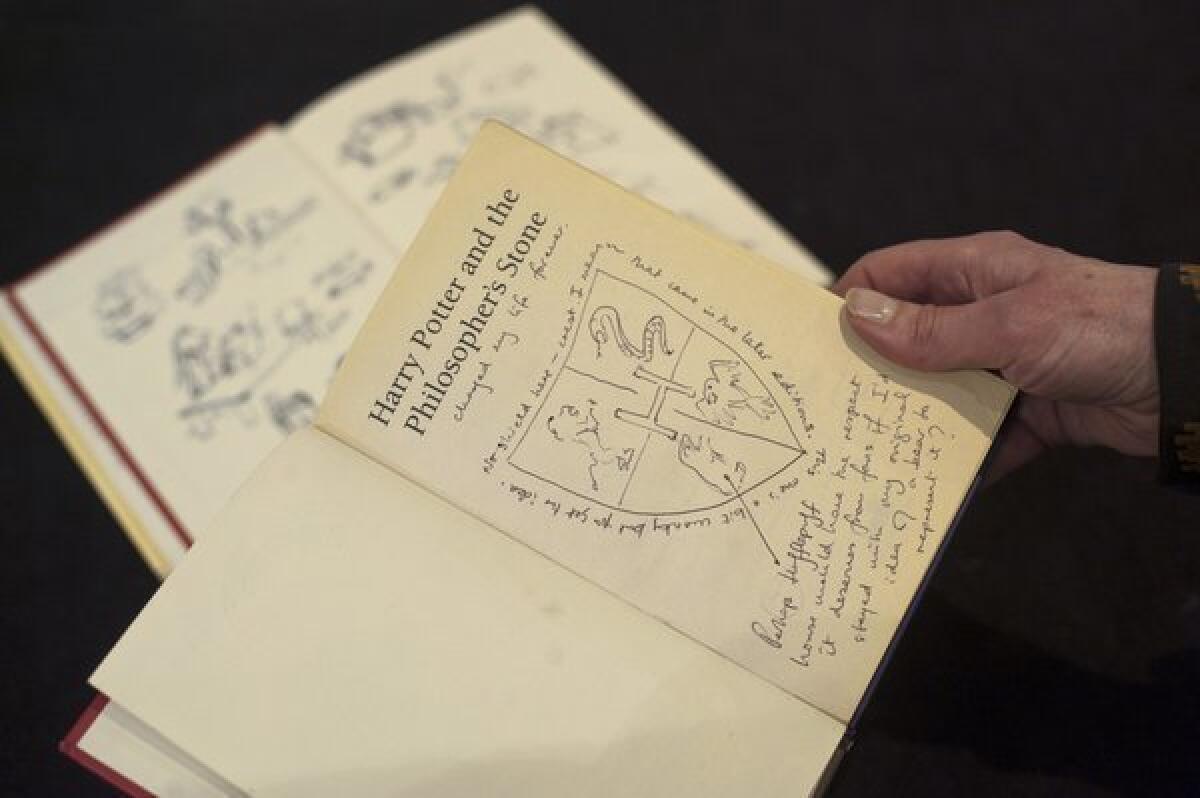J.K. Rowling, other authors reveal secrets in books for PEN auction

What does one of the world’s best-known authors think when she holds the book that made her famous?
J.K. Rowling looks at the title page of the first edition of “Harry Potter and the Philosopher’s Stone,” (as it’s is known in the U.K.) and thinks this book “changed my life forever.” She also thinks: I wish I’d not made a badger the symbol for Hufflepuff in the Hogwarts coat of arms. “Perhaps Hufflepuff would have the respect it deserves from fans if I’d stuck to my original idea of a bear to represent it.”
Those are Rowling’s handwritten notes -- she even drew the shield with a bear inside -- that appear in the first edition copy of “Harry Potter” she’s donated to English PEN. The annotated book will be auctioned off, along with 49 from other famous authors, to raise funds for the writers’ rights group.
The Guardian has made samples available on its website; they include annotated books from Kazuo Ishiguro, Margaret Atwood, Thomas Keneally, Hilary Mantel, Ralph Steadman, Ian McEwan and Nadine Gordimer.
In Rowling’s notes, we learn that she conceived of the sport of Quidditch after a fight with her boyfriend, as she scribbles on page 133: Quidditch “was invented in a small hotel in Manchester after a row with my then boyfriend. I had been pondering the things that hold a society together, cause it to congregate and signify its particular character and knew I needed a sport.”
In his annotated copy of “The Remains of the Day,” Ishiguro reveals the origin of its title. He was on a deserted Australian beach with a group of writers, when he asked them “to come up with something for my almost finished, as-of-yet unnamed novel. Lazing on the sand, I told them nothing about the novel whatsoever, but they eagerly contributed possible titles.” One of the writers came up with an “on-the-spot translation of a term Freud had used to describe dreams that stayed with me. When I got home, I wrote it at the front of my typescript.”
And in her first edition copy of “Bridget Jones’s Diary,” Helen Fielding reveals how upset the actor Hugh Grant was at seeing her refer to his infamous Los Angeles arrest with a prostitute. “Oh dear. Hugh was really upset about putting this in. It was that thing where you forget the famous ‘person’ is the same as the real person. Though had only met him a couple of times. Sent a message via Richard [Curtis] saying ‘Will you forgive me if I [perform a sex act]?’ I won’t tell you what he said but it was very funny. Good old Hugh.”
ALSO:
Bill Clinton visits Colombia, Gabriel Garcia Marquez
The real man behind Roberto Bolano’s post-mortem boom
Revisiting Federico Garcia Lorca in a new novel, and in the writer’s own voice
hector.tobar@latimes.com
More to Read
Sign up for our Book Club newsletter
Get the latest news, events and more from the Los Angeles Times Book Club, and help us get L.A. reading and talking.
You may occasionally receive promotional content from the Los Angeles Times.






